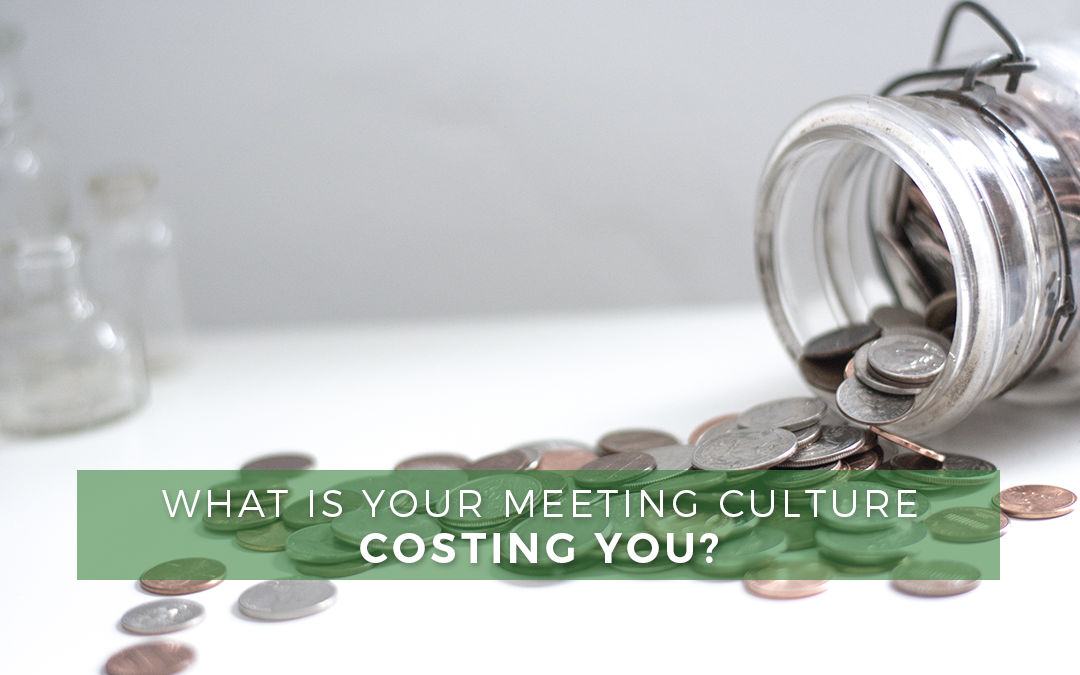Today we have a great guest post from Renee Cullinan, Co-Founder of Stop Meeting Like This. She has worked with Fortune 500 companies for the last 20+ years, bringing clarity, meaning, and momentum to their aspirations, strategies, and priorities.
What is your meeting culture costing you?
We recently conducted an in-depth diagnostic for a 2,500 person organization, in which we found that about 29% of meeting time was wasted. That translated to $80,000,000 in lost productivity every year.
As we debriefed the leader, we put it this way: “Frank, in every conference room in this building people are sitting around burning up your most valuable resources. And you know what the worst part is? They think you want them to.”
His eyes widened as he snapped “WHAT? I run the tightest ship in this company when it comes to budget. I’ve never missed by more than 1% and everyone knows that if you don’t manage your budget, you don’t stay in my organization.”
“Yes,” we countered, “but do you signal the same when it comes to time?”
Unconsciously, Frank was signaling that it was acceptable to use your own and other people’s time as if it were an unlimited and free resource.
Some examples:
1. Frank would often roll into a meeting 5 minutes late. No big deal, right? Wrong. In a 60 minute meeting, starting 5 minutes late is the equivalent to an 8% yield loss. Multiply that by the number of people waiting and it really starts to add up. And because he was chronically late, it became the norm. Even people who were leading meetings would often show up 5 – 7 minutes after the supposed start time.
Not only was this pattern burning time, it was also creating a culture in which people valued their own time over that of the group. And that lack of respect was starting to show through in employee engagement surveys.
2. When he’d get bored in a meeting, he’d start to look at the Giant’s score on his phone and then while he was there, maybe answer an email or two… and pretty soon, Frank, for all intents and purposes, had mentally left the room. Everyone can see it, of course. And so they conclude that multi-tasking is a fine coping strategy for overloaded leaders. But it’s not. It’s a myth, as science repeatedly demonstrates.
In our diagnostic, multi-tasking was pegged as the #1 time waster. Because it was so pervasive, the quality of dialogue was in decline and teams were walking away from meetings with very different perspectives on the outcomes. Inevitably, that led to long email exchanges arbitrating action items and decisions – hindering execution and generating unnecessary friction and frustration.
3. Frank is a busy guy. Naturally, he doesn’t have time to review every report that comes his way. Consequently, his team often found themselves using meeting time to walk him through data, rather than driving to a decision based on it. Their conclusion? Preparing for meetings isn’t expected or rewarded. In fact, those that do so are essentially penalized because they have to sit through the part of the meeting where the non-prepared get briefed.
Naturally, this leads to the need for another meeting.
As a result, a full 30% of meeting time was spent informing and only 5% on decision making. This laborious and protracted decision-making process was wasting time, inhibiting speed, and decreasing agility.
Frank’s leadership signals — it is acceptable to arrive late, multi-tasking is a viable time management strategy, and that there’s no point in preparing — were contributing to at least 25% of the $80M in lost productivity. For a leader who prides himself on fiscal discipline, that was hard to hear. Equally painful was the realization that he was creating a meeting culture that contributed to low employee engagement, inconsistent execution, and slow decision-making.
Fortunately, this data and insight has led to some meaningful conversations with his team about how they collectively value time and they have begun the hard work of setting new expectations for treating it with the same respect and discipline as money.
What are your meeting behaviors signaling to the organization? If these sound at all familiar, check your conference rooms. Your most precious resource is being burned up in there.
Renee Cullinan is the Co-Founder of Stop Meeting Like This. She has worked with Fortune 500 companies for the last 20+ years bringing clarity, meaning, and momentum to their aspirations, strategies, and priorities.
Renee strongly believes in the power of high quality dialogue to transform the performance of organizations and the experience of the people who work within them. She envisions a world in which meetings are a place where work gets done, decisions get made, innovations flourish, and people thrive. She lives near San Francisco with her husband and nine year old daughter.



